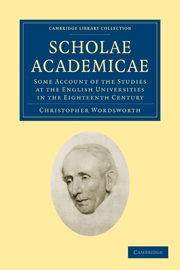 Scholae Academicae
Scholae Academicae Book contents
- Frontmatter
- PREFACE
- Contents
- CHAPTER I GENERAL INTRODUCTION
- CHAPTER II THE TRIPOS, name and thing
- CHAPTER III THE SOPHS' SCHOOLS before 1765
- CHAPTER IV ACTS AND OPPONENCIES after 1772
- CHAPTER V THE SENATE-HOUSE
- CHAPTER VI THE ADMISSION OF QUESTIONISTS. Huddling
- CHAPTER VII THE MATHEMATICKS
- CHAPTER VIII THE TRIVIAL ARTS
- CHAPTER IX HUMANITY
- CHAPTER X MORALS AND CASUISTRY
- CHAPTER XI LAW
- CHAPTER XII MODERN STUDIES
- CHAPTER XIII ORIENTAL STUDIES
- CHAPTER XIV PHYSICK
- CHAPTER XV ANATOMY
- CHAPTER XVI CHEMISTRY
- CHAPTER XVII GEOLOGY AND MINERALOGY
- CHAPTER XVIII BOTANY
- CHAPTER XIX The Degree of M.A.
- CHAPTER XX MUSICK
- CHAPTER XXI ASTRONOMY
- CHAPTER XXII CONCLUSION
- APPENDICES
- INDEX
CHAPTER X - MORALS AND CASUISTRY
Published online by Cambridge University Press: 07 September 2010
- Frontmatter
- PREFACE
- Contents
- CHAPTER I GENERAL INTRODUCTION
- CHAPTER II THE TRIPOS, name and thing
- CHAPTER III THE SOPHS' SCHOOLS before 1765
- CHAPTER IV ACTS AND OPPONENCIES after 1772
- CHAPTER V THE SENATE-HOUSE
- CHAPTER VI THE ADMISSION OF QUESTIONISTS. Huddling
- CHAPTER VII THE MATHEMATICKS
- CHAPTER VIII THE TRIVIAL ARTS
- CHAPTER IX HUMANITY
- CHAPTER X MORALS AND CASUISTRY
- CHAPTER XI LAW
- CHAPTER XII MODERN STUDIES
- CHAPTER XIII ORIENTAL STUDIES
- CHAPTER XIV PHYSICK
- CHAPTER XV ANATOMY
- CHAPTER XVI CHEMISTRY
- CHAPTER XVII GEOLOGY AND MINERALOGY
- CHAPTER XVIII BOTANY
- CHAPTER XIX The Degree of M.A.
- CHAPTER XX MUSICK
- CHAPTER XXI ASTRONOMY
- CHAPTER XXII CONCLUSION
- APPENDICES
- INDEX
Summary
The first number of Mind in 1876 contained a paper by the Rector of Lincoln College, Oxford, on the study of Philosophy in his University. In the next number Mr Henry Sidgwick followed with a sketch of the treatment which that importantstudy has met with at Cambridge in the last two or three generations. The upshot is (so far as concerns our present inquiry) that at neither of our English universities was any serious interest taken in mental science or metaphysics at the commencement of the nineteenth century.
If we glance at the state of England at the close of the seventeenth century, this is very surprising; European thought seemed fully set upon such pursuits, and in our own country the minds of people below the higher ranks were affected by philosophical talk in a way unparalleled even at the present time.
The causes of such a change must be left for others to assign. What effect may have been produced by engrossing wars and commercial interests, by the revival of theological discussions and the increased importance of political questions; or again by the decay of coffee-houses, and the tax on pamphlets, or the revulsion produced by the fate of philosophical Paris, the reign of Decorum, and the growth of delicacy and apprehensiveness of un-orthodoxy—how far these or other powers may have conduced to psychological and ethical apathy, I must leave for others to determine.
- Type
- Chapter
- Information
- Scholae AcademicaeSome Account of the Studies at the English Universities in the Eighteenth Century, pp. 120 - 134Publisher: Cambridge University PressPrint publication year: 2009First published in: 1877


